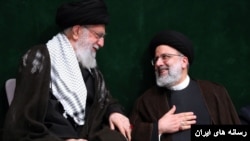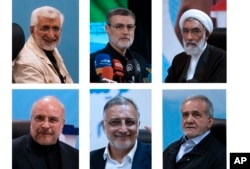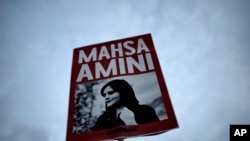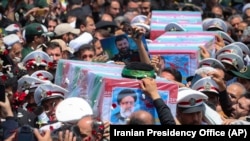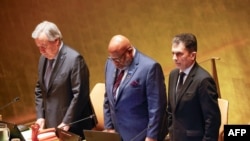On June 11, Iranian embassies worldwide launched a three-day campaign inviting host countries to sign a book of condolences nearly a month after a helicopter crash killed Iran's top state officials, including President Ebrahim Raisi.
Iran is set to hold presidential elections on June 28 after a short-run campaign featuring six candidates pre-approved by the Guardian Council. Iran's Supreme Leader Ali Khamenei is believed to have handpicked the presidential hopefuls from among the country's hardline theocrats.
Ahead of the elections, Khamenei tried to dignify the dark legacy of his late protégé and ally Raisi in a June 4 post on X post:
"President Raisi treated people who had harmed him with dignity. His response to people who had even insulted him was never harsh, ugly, or bad-tempered."
That is false.
Khamenei's praise sparked outrage and criticism from X users, and the platform added a note providing readers with additional context from the community.
Following Raisi's death, the regime in Iran glorified the former president while Iranian pro-democracy activists, human rights groups and democratic governments worldwide recalled Raisi's gloomy record of oppression, executions and brutality.
Decades before winning elections and becoming Iran's eighth president in 2021, Raisi was already nicknamed the "butcher of Tehran" for his role in a death panel that ordered the mass execution of thousands of political prisoners, including 5,000 in 1988 alone.
He openly took pride in ordering the summary execution of dissidents, labeling it as "one of the proud achievements" of the Islamic Republic of Iran.
In November 2019, the United States sanctioned Raisi for gross human rights violations he committed over three decades, particularly for the 1988 mass executions.
As president, Raisi reinforced the regime's oppressive policies, further restricting civil rights and liberties, amplifying gender segregation, crushing dissent and eroding press freedom.
Raisi faced mass protests after his regime denied responsibility for the killing of Mahsa Amini, a young woman who died in police custody after ethics enforcement agents detained her for improperly wearing her hijab – a mandatory headscarf that is required to be wrapped around the female’s head leaving nothing but her face open.
Iranian investigative journalists reported that Amini died from the trauma she sustained at the hands of law enforcement who subjected her to brutal beating, sparking nationwide protests.
Raisi oversaw the violent crackdown on the demonstrations and the unlawful killing of hundreds of protesters and bystanders. Thousands of others were injured or arrested. Rights watchdogs reported torture and ill-treatment of arrested protesters, including rape and other forms of sexual violence.
After suppressing the protests, Raisi's government moved on to toughen the already draconian dress code for women. The regime has sanctified death sentences for artists and singers for their role in the protest movement.
Thousands of Iranians attended Raisi's funeral, along with 68 foreign officials representing 50 countries.
Despite Raisi's decades-long record of human rights abuses, the U.N. General Assembly observed a moment of silence in tribute to the Iranian president. Some 15 countries expressed condolences to the Iranian regime.
U.N. Secretary-General Antonio Guterres offered his condolences, saying, "I wish to assure that the United Nations stands in solidarity with the Iranian people and in the quest for peace, development and fundamental freedoms."
The actions of the U.N. officials sparked outrage among critics of the Iranian regime. Protesters gathered outside the U.N. headquarters in New York City holding signs that read, "Shame on the UN for holding a memorial for Raisi, the butcher of Tehran."
Many countries, including the United States, boycotted the U.N. tribute for Raisi.
The "United States will not attend today's United Nations tribute event for President Raisi in any capacity," Nate Evans, spokesperson for the U.S. delegation in the U.N., stated in an X post.
"The UN should be standing with the people of Iran," Evans said, adding that "Raisi was involved in numerous, horrific human rights abuses, including the extrajudicial killings of thousands of political prisoners in 1988. Some of the worst human rights abuses on record took place during his tenure."
